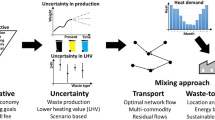Abstract
With the ever expanding consuming societies all over the world, communities are producing increasing amounts of solid waste. A proper disposal of the waste has always been considered a matter of public interest and a basic service to the residents. Since this service requires a vast amount of economic resources and land sites, which are becoming scarce, many communities, particularly in the United States. are facing a difficult problem of how to continue to provide a cost-effective solid waste disposal service to their residents.
A search for suitable land for siting a landfill is both difficult and costly. Further, the sensitivity in recent years to the quality of environment has measurably heightened the cost of developing and operating a landfill site. Consequently, more and more communities have been studying alternative disposal programs to alleviate the problem. One such system, which has recently come into focus, is the resource recovery alternative. The combustion of solid waste in specially designed incinerators and simultaneous recovery of the heat energy are the underlying principles this system is built on.
This paper suggests a model for optimizing the size and configuration of resource recovery facility to suit the present and anticipated disposal needs of a community. The model discussed requires a minimal computational effort.
Similar content being viewed by others
Author information
Authors and Affiliations
Rights and permissions
About this article
Cite this article
Khan, M.R., Goldshmid, T. & Lewis, D.A. Designing an optimal resource recovery facility. Zeitschrift für Operations Research 32, 35–46 (1988). https://doi.org/10.1007/BF01920572
Received:
Revised:
Issue Date:
DOI: https://doi.org/10.1007/BF01920572




